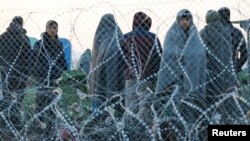The foreign ministers of European Union countries that border the Mediterranean Sea warned member states Friday against “unilateral actions” in dealing with the massive influx of migrants into the continent.
Speaking to reporters after the third Informal Ministerial Meeting of the so-called “Med Group,” Cypriot Foreign Minister Ioannis Kasoulides, who chaired the meeting, said that all member states “should implement what has already been decided."
"Migration remains the major issue testing the EU's unity and ability to respond to an international problem," ministers said in a joint statement after concluding two days of talks in the Cypriot resort of Limassol. "Member states' unilateral actions cannot be a solution to this crisis," the statement said.
The Med Group, which is made up of representatives of Cyprus, Greece, Italy, Malta, Portugal, Spain and France, said that as "front-line states" of the migrant crisis, they feel that “the EU should have a direct and active contribution to the solution of the Syrian conflict, considering the impact of the crisis to the EU and its member states.”
Also Friday, NATO Secretary General Jens Stoltenberg said that a newly deployed force in the Aegean Sea will not play a direct role in combating immigration.
In an opinion-editorial published in newspapers of LENA (Leading European Newspaper Alliance), he said that ”NATO ships will not do the job of national coast guards in the Aegean. Their mission is not to stop or turn back those trying to cross into Europe.”
Stoltenberg said that NATO will be there in a “support role” and the alliance’s “added value” is that it “can facilitate closer cooperation and assist in greater exchange of information between Greece and Turkey.”
Greek authorities had requested that NATO would play a more active role and help stop boats carrying migrants while still in Turkish waters.
Both counties have been under increased pressure to cope with the unprecedented influx of migrants and refuges into Europe.
Greece has seen unabated daily arrivals, which stands at roughly 2,000, since NATO began deploying ships in the Aegean two weeks ago.




